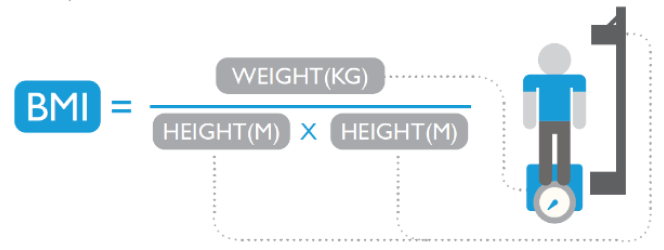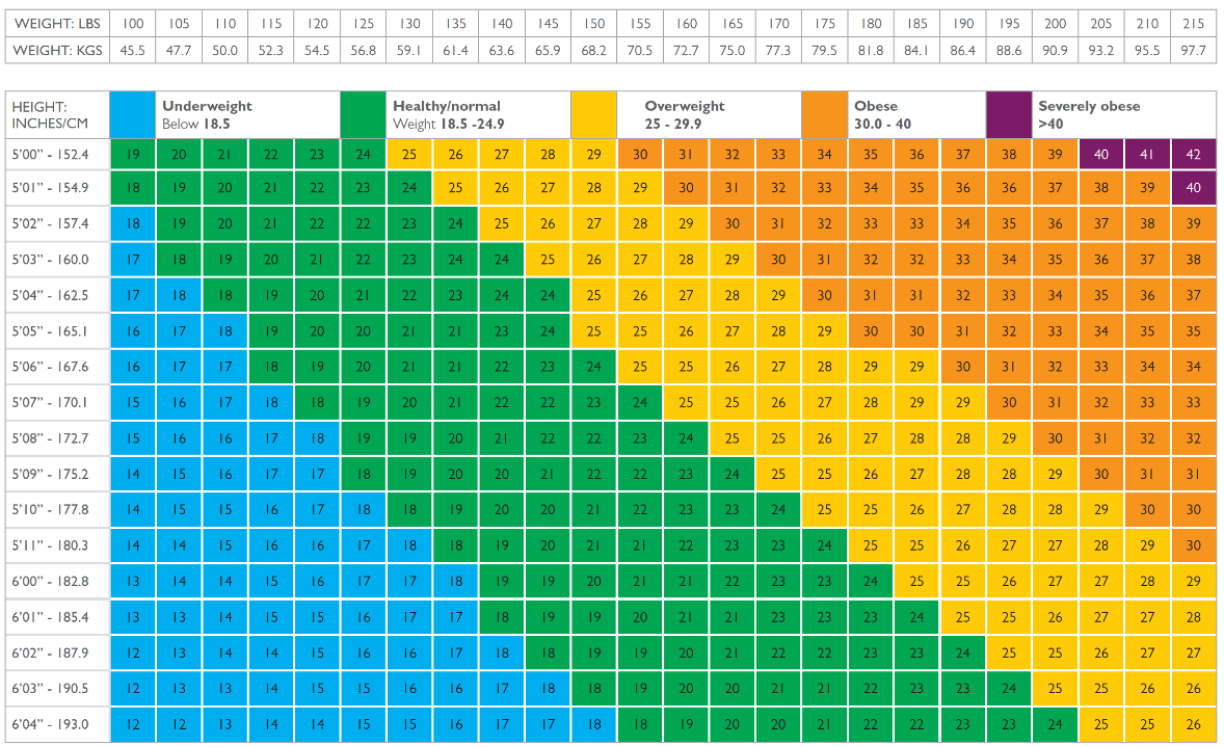
A healthy weight
How do you know if your weight is healthy? In fact there are two measurements that can help you determine if you need to maintain, gain or lose weight: the Body Mass Index (BMI) and the Waist Circumference.
Body Mass Index Calculator
Enter your height and weight using metric or imperial measurements
Body Mass Index Calculator
Your BMI is

Less than 18.5
You may be more likely to develop certain health problems such as:
- Nutrition deficiencies
- Osteoporosis
- Infertility
- Increased susceptibility to infections
18.5 - 24.9
You have a healthy weight and a low risk of developing health problems
25 - 29.9
You have a healthy weight and a low risk of developing health problems
Over 30
30.0 - 34.9 - HIGH RISK
35.0 - 39.9 - VERY HIGH RISK
Over 40
EXTREMELY HIGH RISK
You are at high risk to develop health problems related to weight such as:
- Heart disease
- High blood pressure
- Type 2 diabetes
- Certain cancers
- High cholesterol
- Obstructive sleep apnea
- Gallbladderdisease

Body mass index (BMI)
The Body Mass Index (BMI) is a measure of body fat based on height and weight. The BMI is calculated by measuring a person’s body weight in kilograms and then dividing by the person’s height in metres squared (kg/m2). The good news is that there is not only one single weight value that indicates if your weight is healthy, but there are a range of healthy weights for your height as healthy bodies come in different shapes and sizes.

This is an example to help you calculate your BMI:
- If your weight is 59kg and your height is 164cm, first convert the centimetres into meters by dividing by 100 (i.e. 1.64m).
- Now divide the weight (59kg) by the square of the height (1.64x1.64), 59/2.6896 =21.9.
- The result is that your BMI is 22kg/m2 and in the normal range. The table offers a guide to BMI values and what they mean.
Note:
- Growing children and teens have their own BMI values
- BMI does not apply to pregnant and lactating women
- BMI might be higher for athletes who are usually very muscular, as muscle weighs more than fat

BMI Chart
Another way to estimate your BMI is by using the following chart. Locate the point where your weight and height intersect. Read the number on the dashed line closest to the point of intersection. For example, if you weigh 56 kg and your height is 160 cm, your BMI is almost 22, which is within the normal range.


Let’s get healthy
Another way to estimate your BMI is by using the following chart. Locate the point where your weight and height intersect. Read the number on the dashed line closest to the point of intersection. For example, if you weigh 56 kg and your height is 160 cm, your BMI is almost 22, which is within the normal range.
 Less than 18.5
Less than 18.5
You may be more likely to develop certain health problems such as:
- Nutrition deficiencies
- Osteoporosis
- Infertility
- Increased susceptibility to infections
 18.5 - 24.9
18.5 - 24.9
You have a healthy weight and a low risk of developing health problems
 25.0 - 29.9
25.0 - 29.9
You have a healthy weight and a low risk of developing health problems
 OVER 30.0
OVER 30.0
30.0 - 34.9 - HIGH RISK
35.0 - 39.9 - VERY HIGH RISK
 OVER 40.0
OVER 40.0
EXTREMELY HIGH RISK
You are at high risk to develop health problems related to weight such as:
- Heart disease
- High blood pressure
- Type 2 diabetes
- Certain cancers
- High cholesterol
- Obstructive sleep apnea
- Gallbladderdisease

The waist circumference
The waist circumference is another indicator of health risks associated with excess fat in the abdominal region. If you are an apple shape, you carry more fat in and around your abdominal organs, increasing your risk of many of the serious conditions associated with obesity.
A waist circumference above 80 cm (31.5 inches) for women and 94 cm (37 inches) in men puts you at increased risk of developing health problems such as type 2 diabetes, heart disease and high blood pressure.
How to measure your waist size
To measure your waist size (circumference)
- Place a tape measure around your bare abdomen just above your hip bone, above belly button not hip bone !!!
- Be sure that the tape is snug, but does not compress your skin, and is parallel to the floor.
- Relax, exhale, and measure your waist.





